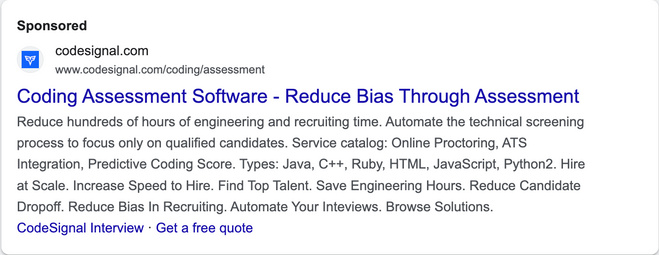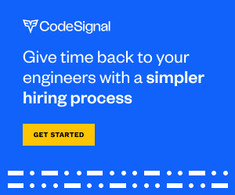case study
CodeSignal's Google Ads Success
284% Increase in Qualified Leads and 46% CPL Decrease

Teaming up with Llama Lead Gen, CodeSignal embarked on an ambitious Google Ads campaign with the goal of redefining their digital marketing presence in the competitive landscape of software engineering talent assessment and recruitment.
The focus of the campaign was on creating a data-driven, strategically diversified approach to not only elevate brand awareness but also drive user engagement and conversions efficiently. The case study underscores the innovative strategies employed and the tangible results achieved through this collaboration, demonstrating a significant reduction in cost per lead and a notable increase in overall campaign effectiveness.
#GoogleAdsSuccess
#DataDrivenMarketing
#PerformanceMax
#ConversionOptimization
#SoftwareEngineeringAds

We brought on Llama Lead Gen to audit our paid Google Search, Display, and Video campaigns, and help us optimize our campaigns at a lower spend. Llama Lead Gen is always responsive and goes above and beyond with responding to our requests. They always offer to help out and implement changes wherever necessary. We saw lowered Cost per Acquisition and improved ROI on ad spend. What's most impressive to me is the breadth of their solutions. We initially brought them on only for paid Google ads but because of the quality of work we were able to expand them to Marketo as well.

Seth Anderson
Senior Marketing Manager @ CodeSignal
An Introduction to CodeSignal’s Google Ads Journey
Client Overview
CodeSignal is a technology company specializing in coding assessments and technical interviewing platforms. They aim to create an unbiased and effective method to evaluate and engage software engineering talent.
Through their range of products, they aim to assist companies in identifying the best coding talents and help individuals showcase their skills to potential employers. Their goals encompass democratizing the technical hiring process and ensuring an efficient and fair evaluation of skills.
Campaign Objectives
CodeSignal’s Google Ads campaigns were strategically designed to meet several key objectives. The company aimed to boost brand awareness and reach across the tech industry significantly. Engagement with their platform was also a focal point, intending to drive more user interaction and participation from companies seeking to hire and individuals seeking to demonstrate their coding abilities.
Ultimately, the campaigns were also directed towards increasing conversions, particularly regarding new client acquisitions, platform sign-ups, and usage of their assessment tools. The campaigns targeted growth, recognition, and user engagement within their targeted markets.

With CodeSignal’s average cost well into the several thousands of dollars, their ideal CPL when we were brought on was hovering around $1,000. With our strategy and efficiencies, we brought that number down quite significantly to ~ $200.
Flight Dates
The CodeSignal Google Ads campaigns were carried out over an extended period, starting from January 2022 and running presently. This time frame allowed for a comprehensive, long-term marketing strategy encompassing seasonal trends and market changes. By spanning for multiple years, the campaigns could be continually optimized and adjusted in response to performance data and market insights, thereby maximizing the effectiveness of the advertising efforts.

Campaign Strategy
Types of Campaigns
Display Campaigns: These were used to visually engage users across different websites, applications, and platforms. With visually appealing ads, CodeSignal was able to capture attention and direct traffic to their site.




Video Campaigns: Through engaging video content on platforms like YouTube, CodeSignal shared insights about their products and how they add value. This visual and interactive approach helped build a deeper connection with potential users.



Search Campaigns: This was divided into Branded and Non-Branded campaigns.
-
Branded: Focused on keywords related to CodeSignal's brand, these campaigns aimed to capture users explicitly searching for their products.
-
Non-Branded: Targeting broader coding and technical keywords helped reach users who might be interested in their services but weren't searching for CodeSignal directly.


Performance Max Campaigns: These campaigns were designed explicitly for optimizing conversions. By utilizing machine learning and automated bidding, CodeSignal was able to maximize its reach and engage users more likely to convert.




Budget Allocation
The budget was strategically distributed across various campaigns to maximize ROI:
-
Display Campaigns: 4%
-
Video Campaigns: 17%
-
Search Campaigns (Branded): 31%
-
Search Campaigns (Non-Branded): 37%
-
Performance Max: 11%
This allocation allowed CodeSignal to balance brand awareness and conversion goals effectively.

Target Audience
CodeSignal's target audience primarily consisted of tech companies, hiring managers, recruiters, and individual coders or software engineers. Different campaigns were tailored to engage these segments:
-
Display and Video Campaigns: Aimed at building brand awareness among tech companies and individual coders.
-
Discovery and Search Campaigns (Non-Branded): Targeted recruiters and hiring managers looking for assessment tools but not necessarily familiar with CodeSignal.
-
Search Campaigns (Branded) and Performance Max: Designed to capture those already interested in CodeSignal or actively looking for their specific services.
By understanding the diverse needs of these audience segments, the campaigns were crafted to resonate with each group and drive engagement, reflecting CodeSignal's multifaceted approach to the market.

Performance Metrics and Analysis
Performance Metrics Over 2 Year Period
Jan 1st, 2022 through Dec 31, 2023
Overall | |
|---|---|
Spend | $1,700,427 |
Impressions | 68,867,180 |
Video Views | 4,661,942 |
Clicks | 540,240 |
CTR | 0.78% |
Display | |
|---|---|
Spend | $202,517 |
Impressions | 34,376,120 |
Clicks | 90,867 |
eCPM | $5.89 |
eCPC | $2.23 |
Branded Search | |
|---|---|
Spend | $568,737 |
Clicks | 187,436 |
eCPC | $3.03 |
CTR | 16.19% |
Non-Branded Search | |
|---|---|
Spend | $646,593 |
Clicks | 94,525 |
eCPC | $6.84 |
CTR | 4.81% |
Performance Max | |
|---|---|
Spend | $60,627 |
Impressions | 1,854,681 |
Clicks | 72,877 |
eCPC | $0.83 |
CTR | 3.93% |
Video | |
|---|---|
Spend | $212,450 |
Impressions | 27,601,627 |
Video Views | 4,605,209 |
eCPV | $0.05 |
Video Played to 25 | 47% |
Video Played to 50 | 31% |
Video Played to 75 | 25% |
Video Played to 100 | 22% |
Clicks | 84,522 |
Yearly Breakdown
2022
-
CPL: $272.85
-
Form Submits: 1,218
-
eCPC: $3.55
-
Spend: $1,066,578
2023
-
CPL: $135.58
-
Form Submits: 4,675
-
eCPC: $2.64
-
Spend: $633,839

Key Insights and Learnings
Assessing CodeSignal’s Google Ads Campaign Outcomes
284% Increase in Qualified Leads and 46% CPL Decrease
The latest Google Ads campaign for CodeSignal has produced some impressive results. The numbers tell a clear story: over 35 million impressions, a noticeable jump in the number of forms submitted this year, and a 46% CPL decrease YoY.
Analyzing the return on advertising spend (ROAS), the shift from a CPL of $272.85 in 2022 to $148.13 in 2023 indicates a movement towards a more profitable trajectory. It seems the decision to focus the majority of the advertising budget on search-related ads was well-founded.
Branded Search campaigns, in particular, have seen a high rate of user clicks, indicating that when people search for CodeSignal by name, they're interested in what they find. This campaign wasn't just about getting CodeSignal's name out there; it was about making sure that name meant something to the people who saw it. And that's exactly what happened – a well-planned strategy that led to a successful connection with the target audience.
Maximize Your Google Ads Impact with Llama Lead Gen
Navigating the intricacies of Google Ads can be a complex affair, but you don’t have to go it alone.
Partner with Llama Lead Gen, and let's replicate the success seen with CodeSignal's campaign for your business.
With a track record of turning clicks into connections, we're poised to help you make your mark with a targeted, data-driven approach.
Reach out and let's transform your Google Ads outcomes together.







